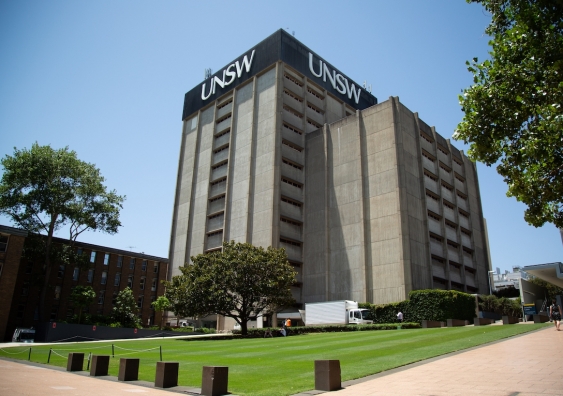UNSW academics elected to Academy of the Social Sciences in Australia
Five UNSW Sydney professors are recognised for their outstanding contribution to the social sciences.
Five UNSW Sydney professors are recognised for their outstanding contribution to the social sciences.

Estelle Jones
Kirby Institute Communications Officer
+61 (02) 9385 9987
e.jones@kirby.unsw.edu.au
Academics from UNSW Medicine, Law, Arts & Social Sciences and Business have been elected Fellows to the Academy of Social Sciences in Australia (ASSA). The ASSA recognises and champions excellence in the social sciences and provides evidence-based advice on a range of social policy issues.
The five new UNSW Fellows are Professor Katherine Boydell at UNSW Medicine and Professor of Mental Health at the Black Dog Institute, Professor Andrew Byrnes and Professor Fleur Johns at UNSW Law, Professor Karen Fisher at the Social Policy Research Centre at UNSW Arts & Social Sciences, and Professor Pauline Grosjean at UNSW Business School. They were among 38 elected to the Academy in 2020 and they join 61 other UNSW academics who have become Fellows.
Professor Boydell is head of the Arts-based Knowledge Translation (ABK) Lab at the Black Dog Institute, as well as director of Knowledge Translation for the Sydney Partnership for Health, Education, Research and Enterprise (SPHERE) – one of eight National Health and Medical Research Council (NHMRC) advanced research translation centres. She is a nationally and internationally recognised qualitative methodologist using the arts in health research as a knowledge translation strategy to create and disseminate knowledge. Her work spans the disciplines of health and medicine, sociology, public health, health services research, and the arts and humanities.
"It is a privilege to join the Academy and the plethora of outstanding academics who are innovators in their fields of study. I look forward to being part of a community of social science colleagues and exchanging knowledge together,” says Professor Boydell.
Professor Byrnes is an international lawyer whose main focus is on human rights law at the national and international levels. His work has encompassed bills of rights in Hong Kong and Australia, United Nations treaties and their implementation, and parliamentary procedures for the protection of human rights, including a term as external legal adviser to the Australian Parliamentary Joint Committee on Human Rights. He is recognised for his contributions on gender and international human rights law and has worked on the rights of persons with disabilities. He has also given expert evidence in cases on human rights including on the death penalty before the Indonesian Supreme Court in the ‘Bali 9’ case. His current work focuses on the desirability of a new international treaty on the human rights of older persons.
“It is a great honour to have been elected to the Academy,” Professor Byrnes says. “I hope it will provide opportunities to develop my current research and policy work on human rights, especially in relation to the human rights of older persons, the importance of which the COVID-19 pandemic and the Royal Commission on Aged Care have underlined.”
Professor Fisher is nationally and internationally recognised for her research that influences individualised disability support, leading to evidence for the National Disability Insurance Scheme (NDIS) and the closure of disability institutions. She has championed the promotion of methods for disability-inclusive research in social policy, now an accepted and increasingly expected approach to fulfil the rights of people with disability.
“The honour of becoming a member of the Academy is recognition of the collective efforts of people with disability and other disability researchers to bring the rights of people with disability into mainstream social science questions. In this new decade, their voices are at the core of social science questions, no longer marginalised to the periphery of social experiences,” Professor Fisher says.
Professor Johns is a highly respected scholar in the field of international law – especially in the theory and socio-legal study of international law. Her writings on the technological transformation of knowledge and decision making on the global plane having placed her at the forefront of international legal thinking on the effects that digital technologies are having on socio-legal relation.
“What a privilege it is to have been given the opportunity to enter into conversation with the Fellows of this esteemed Academy and to work with them to contribute to public debate. I’m very grateful for it,” says Professor Johns.
“On every major issue confronting us in Australia and around the world, social science knowledge is crucial. That is certainly true of issues arising from the impact of digital technology on global order, on which I have been working. I’m excited to learn from colleagues within the Academy and from the diverse constituencies with which the Academy engages, nationally and internationally.”
Professor Grojean studies the historical and dynamic context of economic development. In partlcular she focuses on how culture and institutions interact and shape long-term economic development and individual behaviour. She has published research on the historical process of a wide range of factors that are crucial for economic development, including cooperation and violence, trust, gender norms, support for democracy and for market reforms, immigration, preferences for education and conflict. Professor Grosjean was the Ciriacy-Wantrup post-doctoral fellow at UC Berkeley in 2008 and 2009, and an economist for the European Bank for Reconstruction and Development from 2006 to 2008.